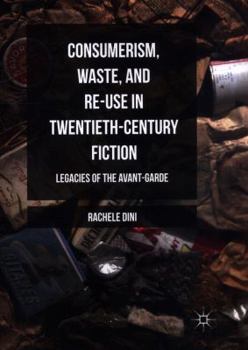Consumerism, Waste, and Re-Use in Twentieth-Century Fiction: Legacies of the Avant-Garde
Select Format
Select Condition 
Book Overview
Table of Contents
Acknowledgements
List of illustrations
Introduction
The commodity
Waste and recuperation
Human wasteSymbols of transience and change
The case for the novel, and for descendants of the avant-garde
From scavenging to window-shopping
Chapter overviews
The case for pursuing "this unattractive occupation"
Chapter One
In search of an epiphany: Redeeming waste and irrupting into the everyday
"The enigmatic side of beings and things" Giorgio de Chirico's Hebdomeros
"Quite unexpected, quite improbable" Andr? Breton's Nadja
Human waste and the aesthetics of the "economically nude" Mina Loy's Insel
Chapter Two
Samuel Beckett's: Human waste in
The Trilogy, Texts for Nothing, and How it I
"[A]ll these questions of worth and value" Partial inventories, failing bodies
"[I]n the rubbish dump" Figurations of human waste
"[S]omewhere someone is uttering" Dwelling and speaking in waste
Chapter Three
Waste in Donald Barthelme, J.G Ballard, and William Gaddis
The writing of "dreck" Donald Barthelme's Snow White
"Things playing a more important part than people" Ballard's urban disaster trilogy
"What America's all about, waste disposal and all" William Gaddis' JR
Chapter Four
"Most of our longings go unfulfilled"
DeLillo's historiographical readings of landfills and nuclear fallout
"Garbage for 20 years"
"Waste is the secret history" Reading the past
"Longing on a large scale" Nostalgia, collecting and waste
"The biggest secrets" Fresh Kills, Consumerism and the Cold War" [A] form of counterhistory" Waste and language
Conclusion
"There lies a darker narrative" Pynchon's Bleeding Edge
"The only truthful thing civilisation produced" Jonathan Miles' Want Not"There's always [an oil spill] happening" Tom McCarthy's Satin Island
The future of waste
Bibliography





